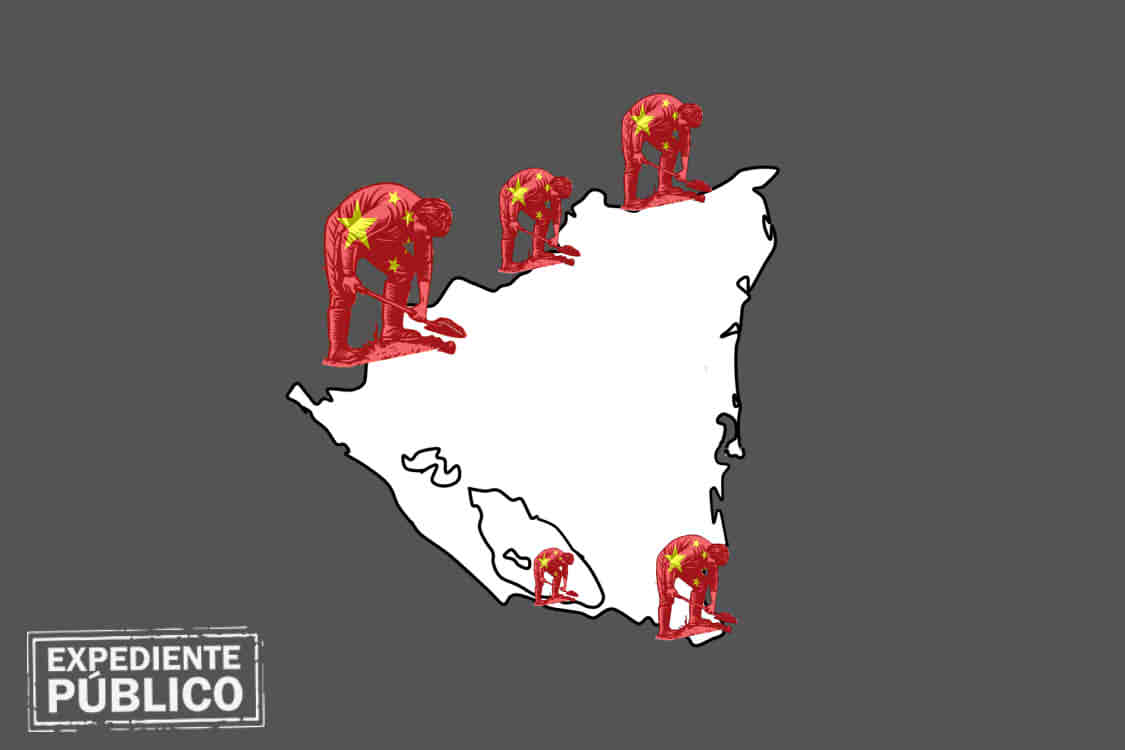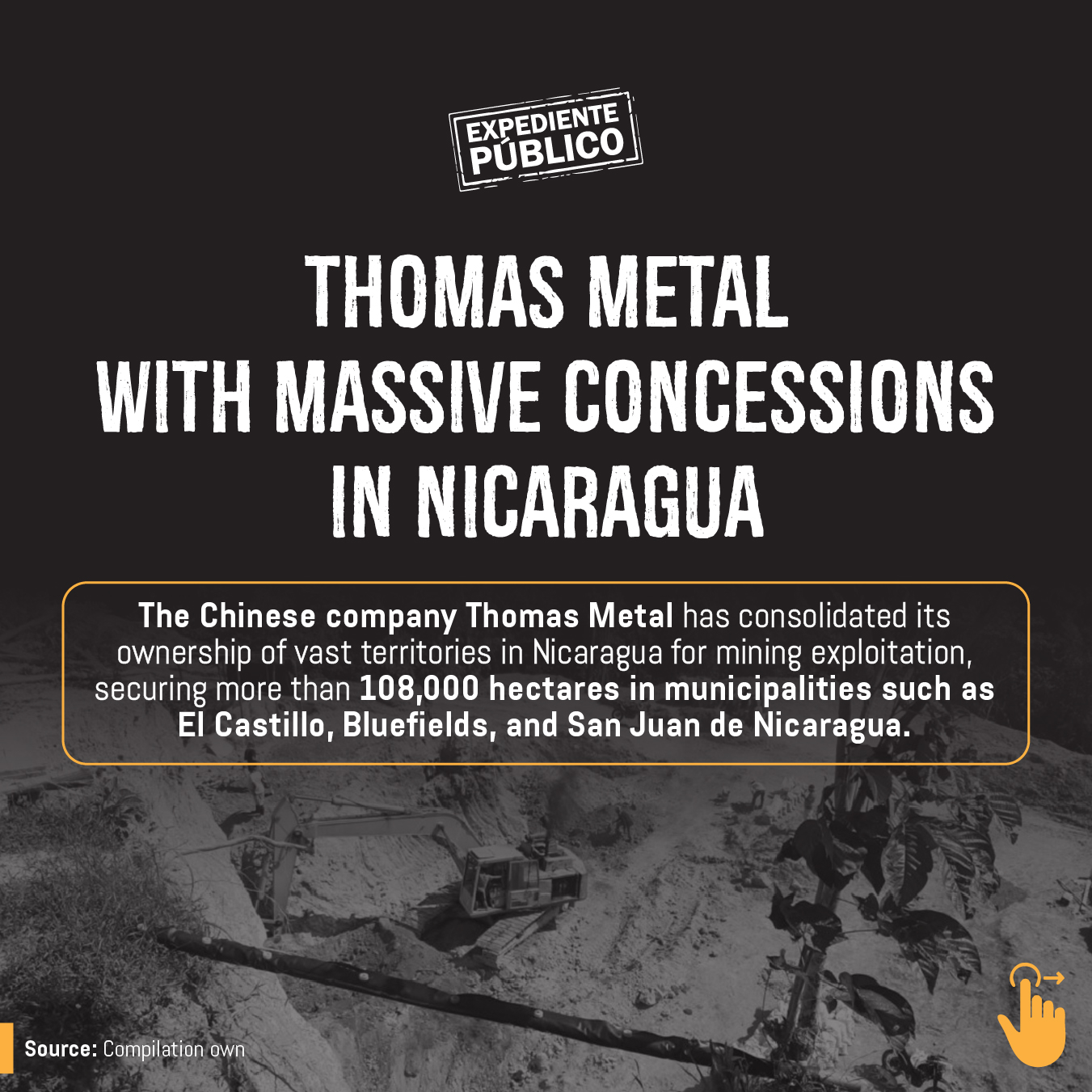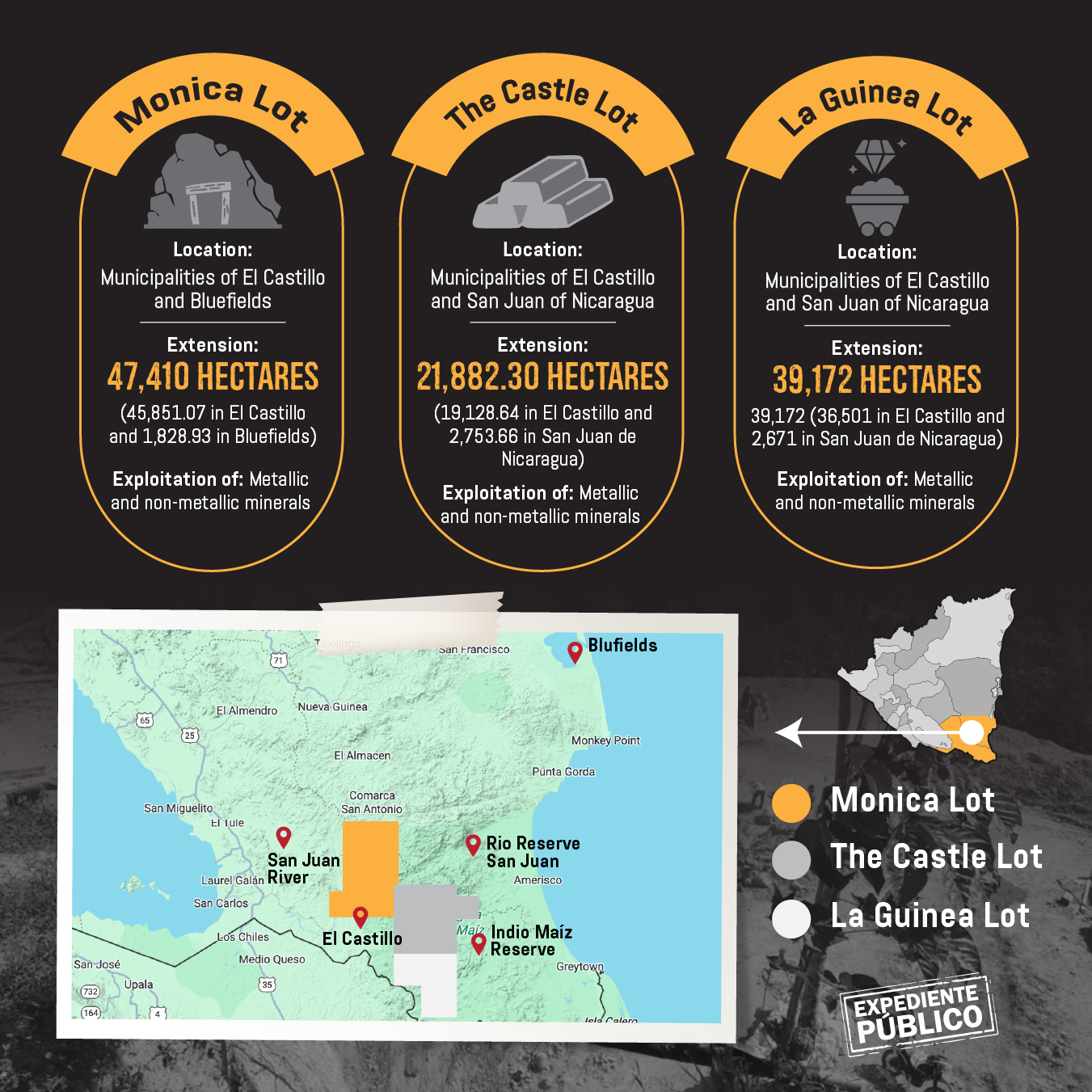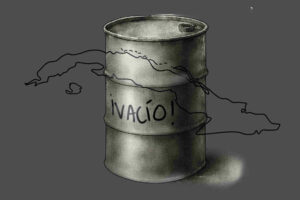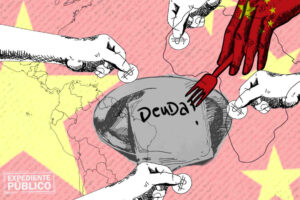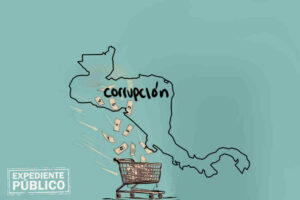* The Ortega-Murillo dictatorship granted Chinese companies the right to mine thousands of hectares of land in border areas, affecting nature reserves and indigenous territories.
* Law 1258, the Border Territory Law, expands the border zone controlled by the State of Nicaragua from 5 to 15 kilometers.
Expediente Público
Chinese mining companies are gaining ground in Nicaragua thanks to the new Border Territory Law, Law 1258, passed by the dictatorship of Daniel Ortega and Rosario Murillo. Under this law, the regime transferred 20,000 square kilometers to state control and expanded the special security zone from 5 to 15 kilometers.
This territory, highly coveted for its mineral wealth, is home to 140 indigenous communities who oppose extractive activity. However, several Chinese mining companies have already received concessions in these areas from Nicaraguan authorities.
Human rights defenders and environmentalists denounce that, with the new law in force, the future of these communities would depend on the collusion between the regimes in Managua and Beijing.
Subscribe to the Expediente Público newsletter and receive more information
The law was approved on August 5, 2025, one day after the Nicaraguan company Thomas Metal S.A., represented by Chinese businessman Xiangming Gu, received its third mining concession near the border with Costa Rica.
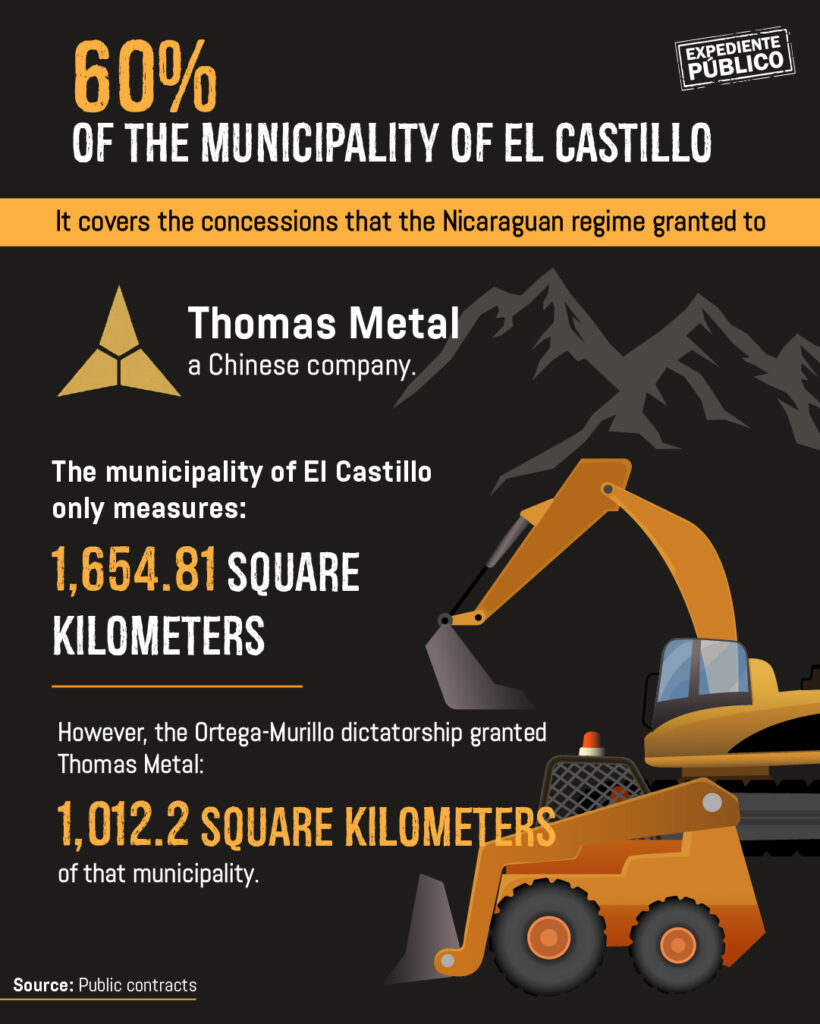
Three mining concessions in less than a week
Thomas Metal SA was incorporated on September 27, 2023. It is the Nicaraguan subsidiary of China’s Brother Metal (HK) Limited, according to information published by the Xi’an International Studies University . The same source notes that Brother Metal, created in 2017, also has mining investments in the Democratic Republic of the Congo.
The three mining concessions granted to Thomas Metal are located on the border between Nicaragua and Costa Rica in the municipalities of El Castillo, Bluefields, and San Juan de Nicaragua.
Thomas Metal received its first mining concession on July 29 of this year. The Ministry of Energy and Mines (MEM) authorized, through a ministerial agreement 037- SBT-M-035-2025, the concession of the La Mónica lot, with an area of 47,410 hectares.
Three days later, on August 1, through the ministerial agreement 039-SBT-M-037-2025 , the same company received authorization for the La Guinea lot, with an area of 21,882 hectares.
You may be interested in: Chinese companies’ poor record of promising investments in Nicaragua
And on August 4, the MEM released the ministerial agreement 040-SBT-M-038-2025, which granted permission to the El Castillo lot, with an area of 39,172 hectares.
Together, the three concessions cover a total of 108,467 hectares. This is equivalent to about 63,800 soccer fields.
The municipality of El Castillo covers an area of 165,481 hectares, according to the Nicaraguan Institute for Municipal Development ( Inifom ). This means that Thomas Metal’s three mining concessions account for 65% of that territory.
More than 700,000 hectares of mining land to Chinese companies
The Ortega-Murillo dictatorship began granting mining concessions to Chinese companies after resuming relations with China in 2021.
Among the beneficiaries are: Brother Metal SA, represented by Chinese businesswoman Xianocun Bao ; Zhong Fu Development SA, represented by Chinese businessman Feiwu Bian ; and Linze Excellent Mining SA and Nicaragua Xinxin Linze Mining Group , both represented by Chinese businesswoman Lijun Dong.
Two of these companies also have concessions in departments bordering Honduras. Linze Excelente Minería SA has received concessions in Nueva Segovia, while Brother Metal SA has rights in Madriz, Chinandega, and the North Caribbean.
In context: Evan Ellis: China’s advance in Central America challenges the U.S.
An ongoing investigation by Expediente Abierto and Fundación del Río, provided in its preliminary version to Expediente Público, reveals that, as of August 2024, the Ortega dictatorship had granted a total of 32 mining lots to eight Chinese industrial companies in Nicaragua. In addition, as of that date, it had a total of three lots in the application process.
The lots Nicaragua granted to Chinese companies up to that date, the document reveals, total 511,179 hectares, while those still pending total 35,817 hectares.
If we add to that amount the 233,297 hectares granted between January and August 2025 to Thomas Metal, Brother Metal and Xinxin Linze Minería Group , in total, the Ortega-Murillo dictatorship has granted 744,476 hectares (7,445 square kilometers) to Chinese companies for mining extraction.
This area is comparable to the size of medium-sized departments in Nicaragua, such as Matagalpa or Chontales.
In 2010, a decade before the Ortega-Murillo dictatorship strengthened its relationship with China, the regime attempted for the first time to establish a 15-kilometer border as property of the Nicaraguan state.
However, due to pressure from the private sector at the time, it remained only 5 kilometers, even under specific regulations that guaranteed the protection of property rights.
Chinese maneuver to «formalize its activities»
Ecuadorian lawyer Mauricio Alarcón, of the Citizenship and Development Foundation, in an interview with Expediente Público , stated that Nicaragua’s new Border Law is confiscatory, violates property rights, and serves China’s interests.
For Alarcón, this law is «an outrage,» since the areas where Chinese mining companies operate «become sovereign Chinese territories, under Chinese rule, Chinese rights, and even Chinese slavery practices.»
He added: «The implementation of a law like this could be a response to direct pressure from China to formalize and legalize everything. We’ve seen this before in Ecuador and other countries in the region. China imposes conditions, mandates, and signs contracts and agreements, establishing what the State must do,» Alarcón stated.
These practices, he added, include «reforming the regulatory framework, passing new legislation, or even going so far as to implement constitutional reforms, if necessary.»
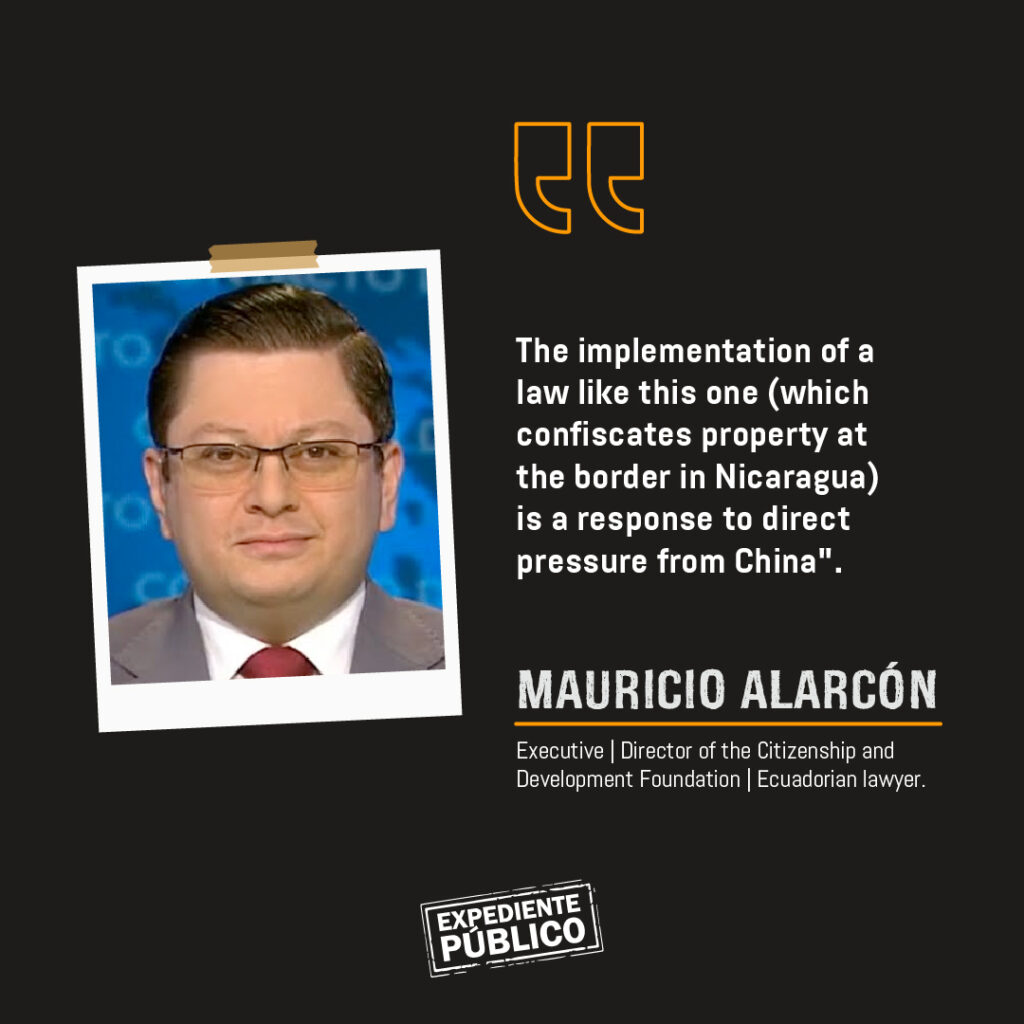
Mining concessions in protected areas
In an interview with Expediente Público, environmentalist and biologist Amaru Ruiz, from the Fundación del Río, denounced that the new border zone overlaps with protected areas.
According to Ruiz, the affected protected areas are: the Bosawás Nature Reserve, the Indio Maíz Reserve, the Río San Juan and Los Guatuzos Wildlife Refuges, and the Dipilto and Jalapa Mountain Range Reserve.
Ruiz stated that mining activity in these areas will jeopardize the ecological connectivity of Mesoamerica. He explained that these reserves function as «natural wildlife corridors,» allowing species to move between the north and south of the region and maintain genetic exchange, which is essential for population stability.
Possible forced displacement
The environmentalist pointed out that these protected areas are home to indigenous, Afro-descendant, and rural communities that depend on fishing, subsistence farming, and the harvesting of forest resources.
These communities have already expressed concern about the impact of the new regulations, which could affect their access to land and natural resources, as well as the conservation of ecosystems, which could lead to forced displacement.
You may be interested in: China Index: Nicaragua, where Chinese influence grew the most
Ruiz added that mining activity in these areas could also affect the national economy, which has a high production of coffee, corn, sorghum, oranges, and shrimp. Additionally, there are beaches that attract tourists.
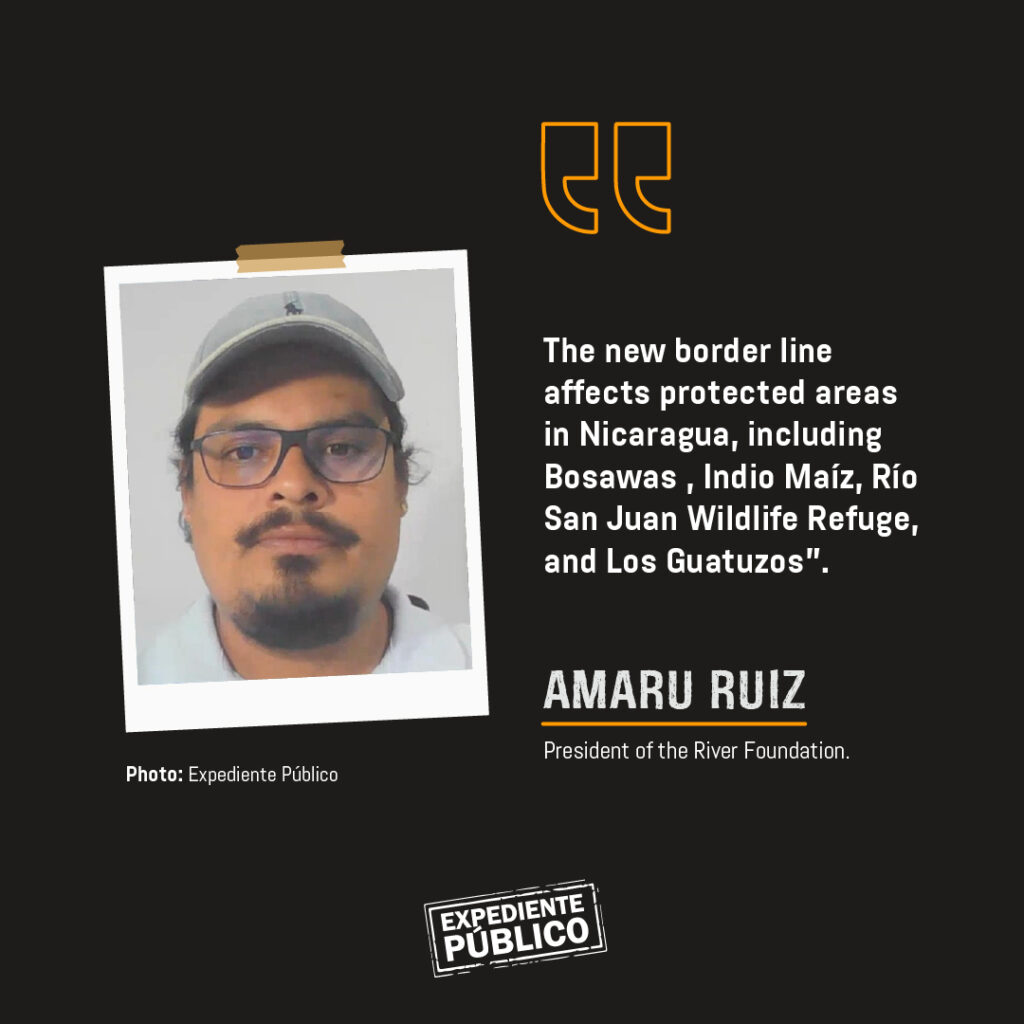
Chinese presence in sight
Prilaka Foundation , a community organization that defends the rights of communities in the Nicaraguan Caribbean, told Expediente Público that among the 140 affected communities are the Wis Wis , Inipuwas , Wayawas , Mukuwas , Kilisnak , Aniwas and Kisu Bila.
The advocates indicated that, in recent months, they have received several reports from residents of communities located along the Coco River, in northeastern Nicaragua, near the border with Honduras.
They have observed the presence of Chinese nationals who claim to have permits to conduct mining exploration, although they have not shown official documentation nor have they been accompanied by Nicaraguan state authorities.

